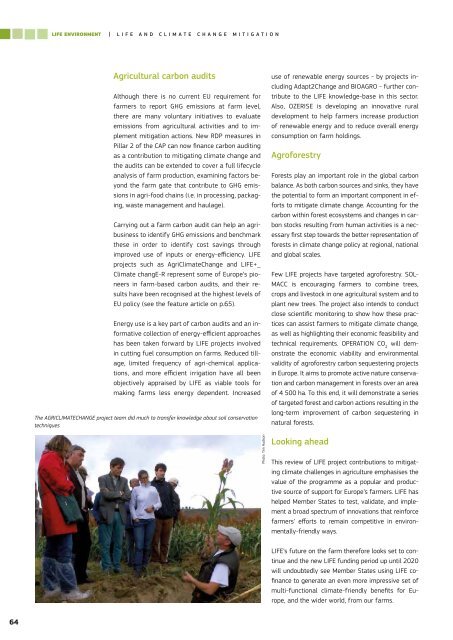Create successful ePaper yourself
Turn your PDF publications into a flip-book with our unique Google optimized e-Paper software.
LIFE ENVIRONMENT |LIFE and Climate CHANGE mitigationAgricultural carbon auditsAlthough there is no current EU requirement forfarmers to report GHG emissions at farm level,there are many voluntary initiatives to evaluateemissions from agricultural activities and to implementmitigation actions. New RDP measures inPillar 2 of the CAP can now finance carbon auditingas a contribution to mitigating climate change andthe audits can be extended to cover a full lifecycleanalysis of farm production, examining factors beyondthe farm gate that contribute to GHG emissionsin agri-food chains (i.e. in processing, packaging,waste management and haulage).Carrying out a farm carbon audit can help an agribusinessto identify GHG emissions and benchmarkthese in order to identify cost savings throughimproved use of inputs or energy-efficiency. LIFEprojects such as AgriClimateChange and LIFE+_Climate changE-R represent some of Europe’s pioneersin farm-based carbon audits, and their resultshave been recognised at the highest levels ofEU policy (see the feature article on p.65).Energy use is a key part of carbon audits and an informativecollection of energy-efficient approacheshas been taken forward by LIFE projects involvedin cutting fuel consumption on farms. Reduced tillage,limited frequency of agri-chemical applications,and more efficient irrigation have all beenobjectively appraised by LIFE as viable tools formaking farms less energy dependent. IncreasedThe AGRICLIMATECHANGE project team did much to transfer knowledge about soil conservationtechniquesPhoto: Tim Hudsonuse of renewable energy sources - by projects includingAdapt2Change and BIOAGRO - further contributeto the LIFE knowledge-base in this sector.Also, OZERISE is developing an innovative ruraldevelopment to help farmers increase productionof renewable energy and to reduce overall energyconsumption on farm holdings.AgroforestryForests play an important role in the global carbonbalance. As both carbon sources and sinks, they havethe potential to form an important component in effortsto mitigate climate change. Accounting for thecarbon within forest ecosystems and changes in carbonstocks resulting from human activities is a necessaryfirst step towards the better representation offorests in climate change policy at regional, nationaland global scales.Few LIFE projects have targeted agroforestry. SOL-MACC is encouraging farmers to combine trees,crops and livestock in one agricultural system and toplant new trees. The project also intends to conductclose scientific monitoring to show how these practicescan assist farmers to mitigate climate change,as well as highlighting their economic feasibility andtechnical requirements. OPERATION CO 2will demonstratethe economic viability and environmentalvalidity of agroforestry carbon sequestering projectsin Europe. It aims to promote active nature conservationand carbon management in forests over an areaof 4 500 ha. To this end, it will demonstrate a seriesof targeted forest and carbon actions resulting in thelong-term improvement of carbon sequestering innatural forests.Looking aheadThis review of LIFE project contributions to mitigatingclimate challenges in agriculture emphasises thevalue of the programme as a popular and productivesource of support for Europe’s farmers. LIFE hashelped Member States to test, validate, and implementa broad spectrum of innovations that reinforcefarmers’ efforts to remain competitive in environmentally-friendlyways.LIFE’s future on the farm therefore looks set to continueand the new LIFE funding period up until 2020will undoubtedly see Member States using LIFE cofinanceto generate an even more impressive set ofmulti-functional climate-friendly benefits for Europe,and the wider world, from our farms.64


